 Future Chronicles Future Chronicles
In that year of 2007, many parts of Serbia and Europe were struck by floods and fires, there were negotiations led about the future status of the southern Serbian province Kosovo and Metohija, Marija Šerifović won the Eurovision Song Contest, the world’s greatest newspapers wrote about the ”Serbian tennis wonder”, swimmer Milorad Čavić won two gold medals at the European Championship, and National Review ”Serbia” commenced publication… That is how future chronicles will remember the year we are now departing from. (NR, ”Foreword”, December 2007)
METROPOLITAN OF MONTENEGRO AND THE LITTORAL JOANIKIJE
Beauty and Goodness
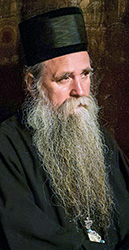 Reading and watching National Review ”Serbia”,we can get to know the natural beauties of Serbia, its rich spiritual and cultural heritage, people from its past and present who, due to their virtues, deserve to be frequently mentioned and kept in lasting memory. Reading and watching National Review ”Serbia”,we can get to know the natural beauties of Serbia, its rich spiritual and cultural heritage, people from its past and present who, due to their virtues, deserve to be frequently mentioned and kept in lasting memory.
The ability of noticing beauty in its countless expressions is a great gift of God, and even greater to know and be able to bring beauty closer and give it to people. This magazine, with its inspirational words and art photography, reached the Hellenic idea of kalokagathia, where beauty and goodness are equated and permeating each other, and, in their mysterious cooperation, fill human life with meaning.
In its activities up to now, Serbia revealed itself as a continuous search for meaning with extraordinary results accomplished. We heartily congratulate its dedicated editorial office for the achieved success, with a wish that God’s mercy makes it stronger for future fruitful work.
PROFESSOR DRAGAN NEDELJKOVIĆ, PHD, ACADEMY MEMBER (1925–2015), SLAVIST
Cure and Encouragement
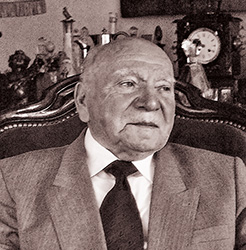 The situation is so difficult that we have no right to pessimism. ”Serbia” National Review reminds of the essential and ancient values we are guardians of. Our values. Our monasteries, our old cities, our natural beauties which often remain hidden to ourselves too (such as the Uvac), our friends (such as the Russian consul Shcherbina, whom a monument was recently raised in Kosovska Mitrovica). It is a magazine lavish in every aspect. Illustrated extraordinarily, with the same such texts. I was writing in the new issue about our friends we sometimes easily forget. We should look up to nations who engrave the names of their great friends, those who helped them when they needed it most, in golden letters in their calendars. The situation is so difficult that we have no right to pessimism. ”Serbia” National Review reminds of the essential and ancient values we are guardians of. Our values. Our monasteries, our old cities, our natural beauties which often remain hidden to ourselves too (such as the Uvac), our friends (such as the Russian consul Shcherbina, whom a monument was recently raised in Kosovska Mitrovica). It is a magazine lavish in every aspect. Illustrated extraordinarily, with the same such texts. I was writing in the new issue about our friends we sometimes easily forget. We should look up to nations who engrave the names of their great friends, those who helped them when they needed it most, in golden letters in their calendars.
Our Middle Ages, as well as some other periods of our history, are valuable heritage, ”great lightness”. We have monuments from that period, not too many, remains of the remains, which is a reason more to preserve them and present them both to our nationals and foreigners. They are the lighthouses and focuses of our spirit, our culture. Not only small nations perish, big ones do too if they are forgetful. One of the important roles of National Review ”Serbia” is not to allow Serbs further forgetting; to wake up from oblivion values which have already sunk there. Even though we have temporarily lost territories and state, we mustn’t lose our spirit and spiritual space.
See, here, in a square in the center of Belgrade, National Review is distributed, and many people are coming in this ice-cold weather. It is distributed as a prosphora, as medication. And it should be. We are splattered with black and yellow press, which poisons our consciousness and makes our life bitter. And National Review is a cure and encouragement.
(Belgrade, Knez Mihailova, January 4, 2008)
 SEPIA copy.jpg) MILOVAN VITEZOVIĆ (1944–2022), WRITER MILOVAN VITEZOVIĆ (1944–2022), WRITER
The Most Serbian
National Review is a magazine not ashamed of Serbia and which will never make Serbia ashamed, anywhere. On the contrary. We create it with ultimate responsibility both towards our people and towards Serbia itself. The magazine at the same time represents the beauties of Serbia (spiritual, cultural and natural) and the fate of Serbs. It is not easy to evaluate something in which creation you have participated. I believe I will not exaggerate by saying that this is the most Serbian magazine today.
(Belgrade, Knez Mihailova, January 4, 2008)
DRAGAN DAVIDOVIĆ, HISTORIAN
Encyclopedia of Shining Serbia
 When, about twenty years ago, director and chief editor Mišo Vujović and his associates were devising National Review ”Serbia”, they established rules they haven’t deviated from even after a hundred issues. That alone is a great endeavor. When, about twenty years ago, director and chief editor Mišo Vujović and his associates were devising National Review ”Serbia”, they established rules they haven’t deviated from even after a hundred issues. That alone is a great endeavor.
First, Serbian lands and Serbian nation will be presented through beautiful stories about people, institutions, geography, culture, history, religion; in a word, about beauty and goodness. It is not because there are no stories about the dark side, but because darkness is dominating all segments of our life. Thus, they took a stand that the least good and beautiful is stronger than the greatest and ugliest evil.
The second golden rule of National Review was to preserve the Cyrillic alphabet, Serbian language, Serbian history, subjects about Orthodox Christianity, Serbian culture and symbols. Of course, so that others would also learn about the ”beautiful face of Serbs”. The Review has been translated into English, and for a period of time into Russian.
The printing, photographs and texts had to be on the highest level.
And there, these rules not only did not change during these hundred issues, but advanced issue after issue. It certainly means that National Review ”Serbia” will enter the history of Serbian publishing, not as just a bibliographic unit, but, together with its rich archive, a protected cultural good of the Serbian nation. Besides, it is a kind of an encyclopedia of the good and beautiful side of Serbia.
(Banjaluka, September 19, 2023)
DRAGAN HAMOVIĆ, WRITER
Source of Driving Forces
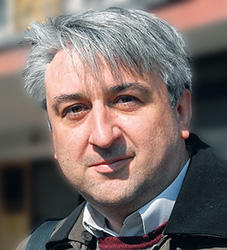 Self-confidence is the precondition of survival and lasting. So many poisonous and deadly words were addressed to the concept of Serbia, to cancel in us what still hadn’t been destroyed. So many times, we, ourselves, convinced that it is how we shall become open spirits, magnified our own shortcomings and backlogs, to the degree no reasonable person would. So many times, while watching into distances, we missed to see the beauties within our grasp. So much strength we spent on making ourselves look like others, on becoming others – without even trying to get to know ourselves better first. ”Your glorious name was erased, / So you don’t know who you are among others”, wrote bitterly enlightened, late Dučić. Along with some endemic features, our shortcomings are neither smaller nor bigger than of other nations. However, it is needed to get to know oneself first, and then compare with others. Self-confidence is the precondition of survival and lasting. So many poisonous and deadly words were addressed to the concept of Serbia, to cancel in us what still hadn’t been destroyed. So many times, we, ourselves, convinced that it is how we shall become open spirits, magnified our own shortcomings and backlogs, to the degree no reasonable person would. So many times, while watching into distances, we missed to see the beauties within our grasp. So much strength we spent on making ourselves look like others, on becoming others – without even trying to get to know ourselves better first. ”Your glorious name was erased, / So you don’t know who you are among others”, wrote bitterly enlightened, late Dučić. Along with some endemic features, our shortcomings are neither smaller nor bigger than of other nations. However, it is needed to get to know oneself first, and then compare with others.
A unique endeavor such as Serbia magazine represents contents of our lives, natural environment and various creative work, contemporariness and history. With its texts and lavish photo stories, it brings closer our better, authentic side. To be exact, the better side of our common profile, our cultural traces or blessed beauties of our lands. For the purpose of strengthening self-confidence and self-awareness. And they are constantly under attack of global, conducted storms that rage the heritage of human action and creation.
Without knowing or without caring about who we are, we agree to what others say we are.
The articles in Serbia open ourselves before us and before those ready to see us in a more realistic light. Perceiving phenomena and people from the affirmative side, as much as there is basis for it. And there still is a basis for it, because the construction spirit, the spirit of self-affirmation is not easy to destroy, such a spirit always overpowers somehow. That is the idea, I think, which the mission of Serbia magazine survives upon. Such an endeavor is so meaningful that it should gain appropriate and unconditional support of our cultural diplomacy. As for myself, thanks to the questions of editor Branislav Matić, I was given the opportunity to deeply unfold my authorial and life incentives. Thus, parts from the interview for Serbia, partially amended and altered, were transferred into my auto-fiction novel Under the Walnut Tree, which gave me nice experiences and responses from readers. However, it was necessary to get the impulse first. First one needs to be set into motion, towards oneself as their objective. National review Serbia actually represents a steady source of driving forces of affirmation at a time of general rule of negation.
MIKAN ANIČIĆ, PAINTER
For Common Cause
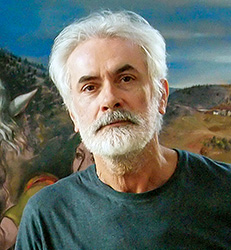 There are nations and countries whose intellectual elite is sufficiently aware and willingly devoted to preserving all national values and their affirmation in the international spiritual scene. There are nations and countries whose intellectual elite is sufficiently aware and willingly devoted to preserving all national values and their affirmation in the international spiritual scene.
One of such nations and countries is France, where I have been living for almost four decades. The French do it with the help of all public media, supported by big exhibition events.
We find such unselfish sacrifice for common cause in the XV century in Italy, when a family in Florence, headed by Lorenzo Medici, surrounded themselves with the greatest authors of their time, such as Leonardo da Vinci, Michelangelo, Sandro Botticelli, Andrea Verrocchio, as well as philosophers, bearers of the idea about the rebirth of great art and uniting the teachings of Plato with Christianity. We saw a similar phenomenon in the same period in the north of Italy, in Milan. Again a family, led by duke of Milan Ludovico Sforza, engages for their needs and general interest the greatest genius of all times Leonardo da Vinci. The same Ludovico Sforza, deeply aware of the importance and value of Leonardo, stated an undeniable planetary truth: ”Perhaps the name of Ludovico Sforza will once be mentioned with the name of Leonardo da Vinci.”
In our small Serbia, National Review ”Serbia” had made such a feat, a magazine established seventeen years ago with the aim to, with a great swing, present the world all spiritual, historical and cultural values of our community. And not only them, but also our economy, health, sports, construction, all the way to the tourism offer typical for our lands.
Thanks to the extraordinary intellectual potential of the National Review ”Serbia” editorial office, we today have a rare representative on the world spiritual map, which carries on the truth and reveals the most sublime values of our nation.
I feel as a fine, honored member of my nation because of having such a magazine, which, following the highest international standards, represents to the world our creativity, our heritage and beauty, and finally our truth.
NAĐA TEŠIĆ (1939–2014), WRITER
They Are My Homeland
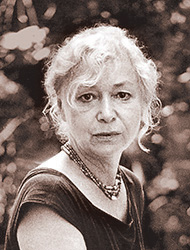 I have left a long time ago and distance did its thing. I was thinking that my country exists only in my memories. That what we today know under its name is something completely different. Then, in the 1990s, my nation dived out before me with all its internal expanse. Although (after that horrible XX century) small, wounded and decimated, it was the only one in the world then, bold enough to stay on its feet before the empire of evil, without looking down, and say its name. To stand on its threshold and say: ”This is my home. You can come as a guest, as a friend, you can always find sanctuary here. You can enter by force, but you will never get out.” I have left a long time ago and distance did its thing. I was thinking that my country exists only in my memories. That what we today know under its name is something completely different. Then, in the 1990s, my nation dived out before me with all its internal expanse. Although (after that horrible XX century) small, wounded and decimated, it was the only one in the world then, bold enough to stay on its feet before the empire of evil, without looking down, and say its name. To stand on its threshold and say: ”This is my home. You can come as a guest, as a friend, you can always find sanctuary here. You can enter by force, but you will never get out.”
I was shocked by that late encounter with my nation, with myself. The ancient fighter for justice and God from its anthem were still alive. Then I came into contact with Bane. I was surprised with the language, the calm self-awareness, the poetry. I realized: he knows. And carries it incredibly well. I taught film directing and script, French literature and academic writing at universities throughout the world, in the furthest West and Far East, but he taught me, me who was his mother’s age, the metaphysics of Homeland and Christ’s spiritual revolution. I had an unusual interview-mosaic for Bane’s magazine. Stubborn as I can sometimes be, I insisted on a hundred small things. He was nice, a gentleman, but did not step back. Everything was his way. What’s most important, when the interview was published, I realized he was right. It was probably my best interview.
National Review is my real Serbia. My ”government in the homeland”. My late peace and my hope, after everything. And it’s not about geography, natural beauties and tourism. You have those everywhere. The thing is in the deepest codes standing behind it, in the archetype and sight. In the blazing heart of man.
(New York, 2012)
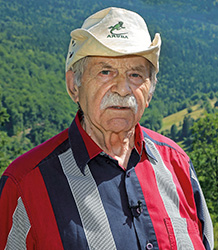 LJUBIVOJE RŠUMOVIĆ, POET LJUBIVOJE RŠUMOVIĆ, POET
Mount Everest
My dear ”Nationalists”, congratulations for conquering the HUNDREDTH ”periodical” Mount Everest, in the name of the honorable cross and golden freedom, all for the benefit of the Serbian nation! I counted on conquering a hundred before you, but I console and encourage myself that eighty-five is also a lot! So, I promise to keep trying to catch up with you! Although even like this, watching your back, I always feel pleasure when your Review comes to my hands!
Warmest regards,
Ršum
SANDRA GAGIĆ, TRANSLATOR
It’s Possible After All
 A hundred carefully carved stones, slowly and thoroughly piled for a fifth of a century, build a reality which goes far beyond the imposed patterns of actuality and daily showers of useless information. The world we are living in, modeled based on the number of clicks, the information that appear, causing short intensive reactions, and forgotten immediately after a new similar information appears, are not the only thing we have got. There is also something much deeper, wider and higher than that. On the other side, there are also media which touch the other, deeper and wider reality, in which we have time to stop, read, think through, understand the essence. Media which, instead of apocalyptic visions of the near future, happiness based only on franticly purchasing and possessing material goods, black chronicles describing events to the very last detail, being intimidated by other people and loneliness, present a future based on knowledge, learning, patriotism, love for our neighbors, unity. Our National Review ”Serbia” is such. Its introductions are a shining light and guardian in the thick darkness we have slipped into without even knowing how or when that happened, and conversations and stories about great poets, writers, painters, sculptors, military leaders, bring us optimism and hope that changing the world is possible after all and that it all depends on each of us. A hundred carefully carved stones, slowly and thoroughly piled for a fifth of a century, build a reality which goes far beyond the imposed patterns of actuality and daily showers of useless information. The world we are living in, modeled based on the number of clicks, the information that appear, causing short intensive reactions, and forgotten immediately after a new similar information appears, are not the only thing we have got. There is also something much deeper, wider and higher than that. On the other side, there are also media which touch the other, deeper and wider reality, in which we have time to stop, read, think through, understand the essence. Media which, instead of apocalyptic visions of the near future, happiness based only on franticly purchasing and possessing material goods, black chronicles describing events to the very last detail, being intimidated by other people and loneliness, present a future based on knowledge, learning, patriotism, love for our neighbors, unity. Our National Review ”Serbia” is such. Its introductions are a shining light and guardian in the thick darkness we have slipped into without even knowing how or when that happened, and conversations and stories about great poets, writers, painters, sculptors, military leaders, bring us optimism and hope that changing the world is possible after all and that it all depends on each of us.
During these twenty years, we have been changing, learning, forgetting, new lives were coming into the world, many have left us forever, but what we have built with a hundred stones is standing steadily and becoming more and more solid with each new rock.
JOVAN PEJČIĆ, LITERATURE HISTORIAN, LITERARY CRITIC
Identity as Value
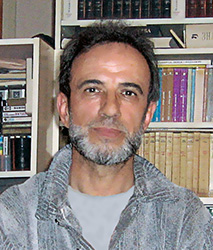 A name is a sign, shield, voice – symbol. Sign: to cross and border, a shield: to defend and guard, voice: to know (remember), establish (confirm), build and develop (open for tomorrow) – symbol: to express a foundation in their unity of intransient and endless individualities and common national aspirations. A name is a sign, shield, voice – symbol. Sign: to cross and border, a shield: to defend and guard, voice: to know (remember), establish (confirm), build and develop (open for tomorrow) – symbol: to express a foundation in their unity of intransient and endless individualities and common national aspirations.
In the historical, geographical, racial, religious, soul-spirit, scientific, artistic…, in the general meta-physical perception and awareness of our nation, such a name is – Serbia.
The history of Serbian periodicals testifies about it in a unique, worthy way. ”Serbia” is the starting name of its birth and lasting to the very day: our first review magazine is – Slavic-Serbian Magazine (1768), the first chronicle magazine – Serbian Daily Paper (1891). Ever since those old times, Serbs have established, in foreign lands and in their own country, in their own and foreign languages, more than 250 newspapers and magazines with the word Serbian in their title.
One of them is Serbia: National Review (2007).
Besides being a child of its time and, as such, an image of the living national and reflection of the world historical spirit, present Serbia is different from magazines, almanacs, reviews of past times, because it was issued simultaneously, unaltered, in two foreign languages, Russian and English.
There is no doubt that this attempt to present Serbiandom and the state of Serbia as a geohistorical, material and cultural, civilizational whole is praiseworthy.
The idea about such an extended presentation of our own nation is not new at all. Moreover, it is as old as Serbian periodicals: in the ”Preface” of the single issue of Slavic-Serbian Magazine,its editor Zaharija Orfelin, after previously explaining the content and graphical design of the magazine, emphasizes that the comprehensive foundation of his enterprise is ”common benefit” of Serbian and other readers.
Similar, if not identical educational will, as a result of new circumstances, is permeating, a bit less than two and a half centuries later, the founding texts of National Review „Serbia”: its purpose, according to editors, is to ”connect the time behind us with the present time and the time coming”, to follow the ”order of the ‘spirit of time’ today and here” in distracted world-historical circumstances, to shape ”a new collective recognition – in spirituality, culture, tradition” (Mišo Vujović), to, besides everything else, mark and signify a great national path of ”returning to our self”, to make Serbian people accustomed to their ”own state name”, ”emotional identification with their own symbols”, to teach us to ”recognize the positive, good and beautiful in our own lives, cities, in streets and squares, in buildings, in the faces of people we meet every day”, in brief, to make it a letter of ”accomplished Serbia” (Branislav Matić).
Ninety-nine issues of ”Serbia” National Review in seventeen years, are extraordinary evidence that the stated words from the program were not thrown into the wind. On the contrary, the richness and variety of contents: anthropological, historical, ethical, esthetical, psycho-social, personal… accompanied, without exception, by visual and photo reports of exquisite expressiveness and beauty, the contents and articles persistently chosen not by opposition or polemics, but to affirm the truths about Serbia and values of that Serbia – makes and requests approaching the hundredth issue (number 100 is, symbolically and mystically, a particular micro or macro-cosmic entity) as an emanation of the liberating, everlasting thought – saying that, in human living on earth, only individuals, only nations with a clear and deep awareness of their individual, own national identity, reach their authentic purpose of existence, work, creation.
The first and greatest value of the celebratory issue of Serbia is, openly speaking, the benefits it offers from its pages, persistently and tirelessly, to Serbian people on their way of national self-recognition, in the area of constant self-confirmation of its national identity.
ŽARKO DRAGOJEVIĆ, DIRECTOR
Looking for the Morning Star in Serbia
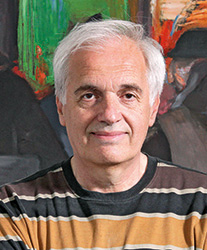 In the circumstances of general social turmoil, in the confusion of pictures and words, invasions of texts and interviews, a publication entitled National Review ”Serbia” appeared in the Serbian media space, in the middle of the decade before last. A magazine different from others in all aspects, dedicated, before all, to its task to present the beautiful face of Serbia, or everything that was left of Serbia, after everything, that wasn’t destroyed or ”coloring with shame” (Justin Popović). To show the original Serbia, the beauty of its landscapes, the mysticism of its monumental past, its good people, hard workers and artists, the beauty of its smile and its generous soul. And all that was selected and composed by the expertly editor’s hand of Branislav Matić, precise in his intensions and crystal clear in his concept. And so on, tirelessly and without stopping, all the way to issue number 100. To a jubilee worth of respect, or, better to say, admiration! In the circumstances of general social turmoil, in the confusion of pictures and words, invasions of texts and interviews, a publication entitled National Review ”Serbia” appeared in the Serbian media space, in the middle of the decade before last. A magazine different from others in all aspects, dedicated, before all, to its task to present the beautiful face of Serbia, or everything that was left of Serbia, after everything, that wasn’t destroyed or ”coloring with shame” (Justin Popović). To show the original Serbia, the beauty of its landscapes, the mysticism of its monumental past, its good people, hard workers and artists, the beauty of its smile and its generous soul. And all that was selected and composed by the expertly editor’s hand of Branislav Matić, precise in his intensions and crystal clear in his concept. And so on, tirelessly and without stopping, all the way to issue number 100. To a jubilee worth of respect, or, better to say, admiration!
”I am looking for the morning star in Serbia”, wrote Miloš Crnjanski in Corfu in 1925, after the Serbian victory in World War I and its tragic state and national disintegration, renouncing its name, its borders, its national and cultural identity. If the comparation is not pretentious, and I believe it is not, National Review ”Serbia” and its editorial team are today following the traces of such inspiration of this poet.
Congratulations to the desk, editorial team and associates of the magazine for their jubilee and wish you all the best for the next hundred issues.
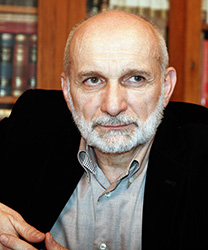 DRAGAN LAKIĆEVIĆ, WRITER DRAGAN LAKIĆEVIĆ, WRITER
Review Serbia
Serbia is certainly a review – of beauty and goodness, old and new. In order to depict its abundance in pictures and words, this neat and graphically wonderful publication was created. An album and prospect in sequels… Upon an invitation, I have started writing a long time ago in it about the natural beauties of Serbian literature and language, great school of memory. In Cyrillic alphabet. To sketch the portraits of those I remember and those intended for others. With all those faces and pictures in Serbia, I will live eternally as well.
DRAGAN ĆIRJANIĆ, DIRECTOR
Descendants of those Who Fight
 In monastic loneliness, far from the noise and lights of contemporary media, yet again in its center, there is a magazine defying everything we call modern, cherishing and preserving Serbian tradition, more and better than many institutions. In almost twenty years of its existence, Serbia – National Review, with its persistence, knowledge and self-awareness, became a kind of an institution of our culture. Like an elixir, it offers us moments of forgetting the gloomy present and opens and cherishes our senses for eternity. It is a magazine that transfers our tradition into present times. In monastic loneliness, far from the noise and lights of contemporary media, yet again in its center, there is a magazine defying everything we call modern, cherishing and preserving Serbian tradition, more and better than many institutions. In almost twenty years of its existence, Serbia – National Review, with its persistence, knowledge and self-awareness, became a kind of an institution of our culture. Like an elixir, it offers us moments of forgetting the gloomy present and opens and cherishes our senses for eternity. It is a magazine that transfers our tradition into present times.
What is that tradition, which we talk and discuss so much about? The more frenzied reality suppresses it, the clearer it gets that without it contemporary man is falling into a dead end of existence. ”The falling West” is not a figure of speech; it is already a diagnose of the entire epigonic, zombified world accompanying it, infected with its ”values”. Serbia is no exception either. Tradition is transposition of a tested experience of the past into the present, necessary to contemporary man to understand the causes of the fall and conquer contradictory reality. Tradition is an extract, the essence of everything individual, a densified history corresponding with religion, with hierarchy, with a feeling for eternity, everything lacking in our reality. Let us observe tradition as a kind of surveillance over the present. Its most stable landmark. Tradition is faith that everything worthy, everything great, will be preserved and built into the future and that possible to repeat. Deep faith in the possibility of the appearance of new holy Serbian kings, the repeated feat in the Battle of Kosovo, repeated Dušan’s empire, religious zeal and spirit of St. Sava, the Iron Regiment, all our Serbian voivodes again… heroism of the uprisers, new Middle Ages, transposed and stronger than before. Repeated Miloš Crnjanski, Milanković and Tesla in whom the unique Serbian genius dwells and emanates from.
These patient devotees, without hope in direct results and outcome, deleting the border between history and present time, renew the sources of power and inspiration for the present, which we, through many rituals, religiously approach as eternity.
Serbian force and abundance can suffer moments and entire periods of interruptions, and then, with the force of its vitality, compensate, replace and rebuild everything necessary for life. Serbs possess the energy of survival and entire registers of memory for different challenges of contemporariness. As a lantern lights the way only to the one carrying it, Serbian tradition lights the way only to its heirs.
It is wrong and in vain to wait for peaceful moments of order and serenity. We should thank the unique place of our love and battle for survival, the place we call Serbia, for giving us liveliness and sharpening our senses. Without constant danger, we would die of comfortableness, in the impersonality of existence. We should embrace our reality as constant war, as our real happiness, our privilege. We are descendants of those who fight.
With such a magazine-treasury, time matures, and personalities are brought up, who will move towards creating the monumental history of Serbia, to use Nietzsche’s term, the history intended only for remarkable individuals to understand the essence of our culture and past, to create life based on the very best Serbia is made of. Creating a monumental synthesis of spiritual and material aspirations of Serbia through time requests particular skill and understanding. One must understand it, the secret whispers of our temples, their language and message. The purpose of our heroism and great sacrifices. The purpose of the characteristically Serbian continual feats.
There is much to create and shape in the future. It is the monumental history which feeds our self-esteem for great and bold deeds, worthy of our best ancestors who accepted challenges and fought against paralyzing impulses always and everywhere around us. Thus, paradoxically, in a way, we should be satisfied and understand why fate has granted us suffering and difficult life, because remarkable individuals who establish and preserve the size of spiritual value grow only on such soil. That history is not antiquarian, convenient and decorative, it is life-giving. Cruel. Every genuine existence requests sacrifice. That is the real beauty of life.
The treasury of National Review magazine creates fertile ground for such a monument history of Serbia, its cultural core. The feat of its existence brings hope that such history will soon be created. Dedicated work regardless of the outcome is the formula for survival in these difficult times.
NIKOLA MALOVIĆ, WRITER
Serbian Written Institution
 landscape copy.jpg) National Review ”Serbia” is a Serbian written institution. National Review ”Serbia” is a Serbian written institution.
One of the rare ones. Is one of them the, always on the side of power and dependent on it – Politika? Yes, but Politika and Serbia are elements of two sets, and it is not only because Politika is a daily newspaper established in 1904, and Serbia a bimonthly magazine a bit less than 20 years old, whose 100th jubilee we are celebrating.
National Review is a project of refined minds who, during this time, succeeded in creating a magazine-format encyclopedic wonder.
In its modernly designed and equipped high-quality pages, in full color, National Review hosted all names that mean something in contemporary Serbian culture, art, science, names with recommending works standing behind them.
Can National Review survive until its 200th issue depends on successors who hardly made it through the destroyed educational institutions, as well as on geopolitics, because if Collective West responds with a strategic nuclear bomb to the extorted Russian tactical one, Serbia will be both ideologically and physically, God forbid, ground up, which no magazine will dare write about, since Serbia will not exist anymore.
Future coastal inhabitant since MDCXCIV, I prefer to argue with Njegoš’ thought that whoever stands on a hill for a while, sees more than the one below the hill. Certainly, Njegoš thought about the point of view of a monk-monarch touched by the branch of St. Sava, however at the time Serbia and Montenegro became colonial type democracies, living in zero altitude offers a different view of the world: seeing that Serbia is one of the rare so-called landlocked countries, a country surrounded with land, therefore convicted to dying slowly unless it submits to the ideology of Collective West, which is strangling it, just like Russia, in an Anaconda’s embrace.
Someone would say that the writer of this text is speaking from the edge of Serbian geography and culture.
Watching the Island of St. Archangel Michael every day, becoming an island when the tide comes, in the Tivat gulf, Bay of Boka, in the place where St. Sava himself, in 1219, established the Diocese of Zeta, forerunner of present Metropolitanate of Montenegro and the Littoral, I am not merely a man who comes out to sea with himself and his work. I am standing here anchored. And taking action.
(Herceg-Novi, August 29, 2023)
DEJAN ĐORIĆ, ART CRITIC
The Better Serbia
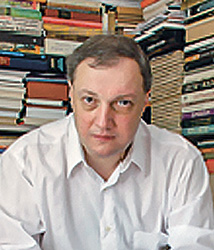 Why am I writing for National Review ”Serbia”? This potential question is directly related to its reputation. It’s not just about external features, the fact that, for a while now, it is the most luxurious, elite Serbian magazine; it’s more about internal reasons. Writing for this magazine is a form of spiritual freedom, not exhausted in the relation between editor and associates. As an island, oasis, which it believes should be entire Serbia, in the sea of horror and chaos of postdemocratic history without salvation, this magazine is deprived of anything superficial, vulgar or commercial. Its specific importance is in beauty and meaning, which is today the basic presumption of spiritual health. There were similar attempts in the history of Serbian publishing (just remember the brilliant Raška magazine, which had two issues published between the world wars, or Beautiful Serbia). No matter how extraordinary, they were just exceptions with one or two published issues. Only National Review ”Serbia” has been lasting and advancing, getting better and greater in graphic design, printing, volume and purposefulness. It is a magazine which is never thrown away or cut; artists and collectors long to have something about them published in it, and that is the answer from my, artistic area, to the question whether this magazine has left any traces. Its other faces, other phenomena into which it persistently and consistently enters, are even more various and richer. It is an edition which, before all, has contents. Its 100 issues represent it as a kind of an informal and wonderful encyclopedia of Serbian culture, history, science, geography, religion, literature and art, as well as a dictionary of biographies of eminent Serbs, many of them saved from oblivion or perceived in a new way thanks to the efforts of editors and associates. I can definitely say it its associate from the first issue. It is an expression of the better Serbia, which is disappearing and arising, which is eternal only as an expression of ethics and esthetics, talent and work, faith and hope. Why am I writing for National Review ”Serbia”? This potential question is directly related to its reputation. It’s not just about external features, the fact that, for a while now, it is the most luxurious, elite Serbian magazine; it’s more about internal reasons. Writing for this magazine is a form of spiritual freedom, not exhausted in the relation between editor and associates. As an island, oasis, which it believes should be entire Serbia, in the sea of horror and chaos of postdemocratic history without salvation, this magazine is deprived of anything superficial, vulgar or commercial. Its specific importance is in beauty and meaning, which is today the basic presumption of spiritual health. There were similar attempts in the history of Serbian publishing (just remember the brilliant Raška magazine, which had two issues published between the world wars, or Beautiful Serbia). No matter how extraordinary, they were just exceptions with one or two published issues. Only National Review ”Serbia” has been lasting and advancing, getting better and greater in graphic design, printing, volume and purposefulness. It is a magazine which is never thrown away or cut; artists and collectors long to have something about them published in it, and that is the answer from my, artistic area, to the question whether this magazine has left any traces. Its other faces, other phenomena into which it persistently and consistently enters, are even more various and richer. It is an edition which, before all, has contents. Its 100 issues represent it as a kind of an informal and wonderful encyclopedia of Serbian culture, history, science, geography, religion, literature and art, as well as a dictionary of biographies of eminent Serbs, many of them saved from oblivion or perceived in a new way thanks to the efforts of editors and associates. I can definitely say it its associate from the first issue. It is an expression of the better Serbia, which is disappearing and arising, which is eternal only as an expression of ethics and esthetics, talent and work, faith and hope.
PROTOIEREUS JOVAN PLAMENAC
Idea of Matica and Shield
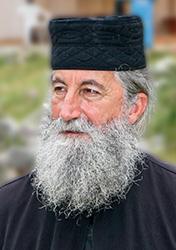 In the past twenty years of rapid technological development of mankind, the way of life has been altered more than in the past two centuries. The first issue of National Review ”Serbia” was printed in April 2007. There were no androids or iPhones back then. There was no Instagram, Viber; Twitter was just founded, and Facebook and YouTube were just coming to life… In the past twenty years of rapid technological development of mankind, the way of life has been altered more than in the past two centuries. The first issue of National Review ”Serbia” was printed in April 2007. There were no androids or iPhones back then. There was no Instagram, Viber; Twitter was just founded, and Facebook and YouTube were just coming to life…
The Review was designed and based on a similar idea Matica Srpska, the oldest Serbian cultural and scientific institution, was founded on almost two hundred years earlier, on the idea of encouraging, cherishing and preserving Serbian national cultural and spiritual self and its affirmation in other nations. Ever since its birth on the Serbian media scene, boiling on the oven of various political, ideological, business and other interests, and then boiling over into mainstream journalism, it shines like a princess dressed in supreme quality graphic design and printing, ornamented with eloquent and well-mannered texts and masterly photographs, nurtured with a filigree editor’s hand.
At the time of the Review’s life, addiction to social networks has largely surpassed tobacco, gambling, alcohol and other addictions, while reading and writing are reduced to twits, SMS, Viber and other similar messages. In that short time, pouring out mostly on social networks, the new pagan ideology of Western globalism has largely caught the Serbian nation as well, its media, education, social institutions, science… corroding its cultural and spiritual being, particularly hitting Serbian family.
Each such strike into the being of the Serbian nation, National Review ”Serbia” accepts like a nail in its body,holding firmly onto the traditional value system, on which the Serbian nation has survived throughout the centuries of its history.
(Bar, September 7, 2023)
NATAŠA VELJKOVIĆ, PIANIST
It’s Impossible without Self-Awareness
 ”The spirit of time is best seen in the newspapers.” The truthfulness of this sentence made me think. How often have we seen people reading newspapers lately, especially those with texts that enrich us spiritually, remind us that we come from a fairytale land ”in the hilly Balkans”? Not so often. And it has never been more necessary to be informed in a different way, more subtly, historically interesting, where everyday life is suppressed by recognizing deeper values of a society and reminding of them. That is exactly how a different actuality appears – from a binocular turned towards the past and its expanses of patience, different understanding of time, from thoughts written on paper and sweet sounds of lutes and birds. It has never been more necessary to remember the past and people who, with their spirituality and mind, carried the past and conquered the Olympus of the future. ”The spirit of time is best seen in the newspapers.” The truthfulness of this sentence made me think. How often have we seen people reading newspapers lately, especially those with texts that enrich us spiritually, remind us that we come from a fairytale land ”in the hilly Balkans”? Not so often. And it has never been more necessary to be informed in a different way, more subtly, historically interesting, where everyday life is suppressed by recognizing deeper values of a society and reminding of them. That is exactly how a different actuality appears – from a binocular turned towards the past and its expanses of patience, different understanding of time, from thoughts written on paper and sweet sounds of lutes and birds. It has never been more necessary to remember the past and people who, with their spirituality and mind, carried the past and conquered the Olympus of the future.
I am holding National Review ”Serbia” in my hand, remembering the past times and, at the same time, receiving the most up to date review of events in a country! While going through the pages of this bimonthly magazine, I set off to various exciting journeys, go mountaineering, hiking. While reading these texts, I feel both farsighted and having a sharp eye for filigree details, as if watching from the prism of the past into the future, and I look forward to each following issue.
Almost twenty years were invested into these hundred issues of National Review ”Serbia”, a jubilee worth celebrating! Revealing the poetry of a country in the most subtle manner, a hymn to spirituality and the state of Serbia – isn’t that the mission ahead of us? Isn’t that the best defense from the ”ugly, dirty and evil”, from the trash we are drowning in? The magic of pictures, with texts that take us into the hidden richness of the land, mind, nature, culture, come to me while reading National Review ”Serbia”. I meet writer and polyglot Vladan Desnica, poetess and nun Jefimija from the XIV century, the great trustee Vlajko Kalenić, remembered for his humbleness and generosity… Then I hear a good, soft voice, whispering to me: ”Not everything will die.” ”Non omnis moriar.” And I discover the main thing: it’s impossible without culture and cherishing self-awareness.
(Vienna, September 12, 2023)
GOJKO RAIČEVIĆ, CHIEF EDITOR OF THE IN4S PORTAL
Without Giving In
 The walk through history of the Serbian nation testifies about decades and centuries of painstaking existence, marked by ruthless fighting, before all for freedom. Such circumstances were followed by numerous feats and flashes of the Serbian spirit. In a time of gloomy and uncertain everyday life, of unacceptably shaken and faded memory of shiny examples of our existence as a nation, shines the light of brilliant National Review ”Serbia” – fights, resists, suffers, testifies, without giving in! The walk through history of the Serbian nation testifies about decades and centuries of painstaking existence, marked by ruthless fighting, before all for freedom. Such circumstances were followed by numerous feats and flashes of the Serbian spirit. In a time of gloomy and uncertain everyday life, of unacceptably shaken and faded memory of shiny examples of our existence as a nation, shines the light of brilliant National Review ”Serbia” – fights, resists, suffers, testifies, without giving in!
It is guarding our culture, our alphabet, our heroes, our brilliant minds from the river of oblivion. While fighting for everything and for them, it is also fighting for us today. It is a battle against the horrifying easiness of semi-existence, against the constant race with time and non-pithy moment. National Review ”Serbia” is one of those last newspapers that defy the autumn storm, standing solidly against its tree and on its tree, enduring the winds and implacable cruelty of nature. So, that is why I believe that, even when everything dries up, if and when we, as a nation, remain alone before the plague of modern times, we will not be alone. There will be individuals, there will be their shields and road signs for an entire nation in a terrible time. Such people and such strong spirits are gathered in one place by your and our Serbia, which is today celebrating a wonderful and significant jubilee – an event telling us all that, to paraphrase verses of a song, not everything is gross and net, there is something sacred as well.
My esteemed friends, on behalf of the IN4S portal’s editorial desk, your companion in the battle for truth and the Serbian nation, I congratulate you your jubilee, our common holiday and solid proof that we must never give up, no matter how difficult things are. In such a critical time, we must be venturers. That is our national assignment.
MIRJANA KUSMUK, JOURNALIST
Faith in Ourselves
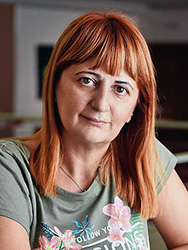 It is not important whether a journalist is literate, it’s important they’re good people! That definition of journalism and journalists was written a long time ago by one of them, Jug Grizelj, and that is, I believe, the essence of this profession.The essence of journalist Mišo Vujović. It is not important whether a journalist is literate, it’s important they’re good people! That definition of journalism and journalists was written a long time ago by one of them, Jug Grizelj, and that is, I believe, the essence of this profession.The essence of journalist Mišo Vujović.
When twenty years ago Mišo Vujović, both literate and good man, set off into the battle for the ”Beautiful Face of Serbia”, he didn’t even anticipate how difficult the road and how important the battle will be.
On that road we encountered the era of tabloidization, realities, black chronicles. Journalism was killed by the battle for clicks, for score, which attracts advertisers. The blacker, the better, the more popular. The more bloodthirsty, the more exclusive. The more profitable. Advertisers became actual editors from the shadows, and the truth, well, who else cares about it when there is a pricelist for every lie.
In that and such media environment, creating a serious magazine, a magazine promoting history, culture, sports, the best people the Serbian nation has given, is a battle worth admiring.
Only great strength and faith in the idea, faith in the ”Beautiful Face of Serbia”, Mišo Vujović and his associates, their persistence to fulfill the mission, could preserve National Review during these twenty years and all the hundred issues.
I am sad and disappointed because the attempt to establish National Review in Srpska as well did not succeed. But you know us: interests, vanity and jealousy… And it could have been better!
But to go back to where I have started.
I have been editor in the media for a long time. I know how difficult, stressful, requesting that job is. Particularly if you do it without recycling, without reworking contents, but trying to follow the basic mission of the media: educating the nation and shaping its cultural and historical consciousness. Following that editorial principle, National Review ”Serbia” succeeded in returning faith in ourselves, in collecting us and giving us hope to know who we are and where we are going.
For many years to come! To the joy and pleasure of beautiful Serbia.
(Banjaluka, September 2023)
ALEKSANDAR LAZIĆ, CHIEF EDITOR OF ”STANJE STVARI”
For Fixing Serbia
 It wasn’t necessary to hold each of the previous 99 issues to understand that National Review ”Serbia” looks better than Serbia itself; however, luxurious equipment and expertly chosen texts are not functioning as dead criticism, but as a gentle reproach, as if saying to an aged parent with love ”you can do it better” or ”you can do it as before”. Thus, National Review ”Serbia” reminds us of the old glory and announces a new one, at the same time showing that ”not everything has perished when it has perished” and that we are today better than it could be concluded at first glance. It wasn’t necessary to hold each of the previous 99 issues to understand that National Review ”Serbia” looks better than Serbia itself; however, luxurious equipment and expertly chosen texts are not functioning as dead criticism, but as a gentle reproach, as if saying to an aged parent with love ”you can do it better” or ”you can do it as before”. Thus, National Review ”Serbia” reminds us of the old glory and announces a new one, at the same time showing that ”not everything has perished when it has perished” and that we are today better than it could be concluded at first glance.
While the cowardly attitudes ”this is nowhere to be found” and ”if we’re not the worst, we’re near being the worst” is imposed from all sides, National Review has been proving differently for about twenty years and showing the clean and washed face of Serbia. For advancement we need ”sacrifice and hope” (supertitle of issue 98), non-yielding and awareness that engagement makes sense, and then – NOT EVERYTHING WILL DIE (as underlined on the cover of the same issue). That is why National Review ”Serbia” is beneficial for entire Serbiandom and subversive for its opponents; realizing who you were, who you are and where you are going – as well as how far you can reach – can be a beginning of a wonderful Fixing/Recuperation.
ACA CELTIC, ”ORTHODOX CELTS”
A Legend of Slavia and Serbia
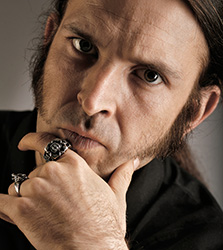 A long time ago, in the dawn of time, lived Slavia. A long time ago, in the dawn of time, lived Slavia.
Slavia was hardworking, resolute and determined, some would say stubborn, but, before all, proud and brave.
Slavia was wealthy.
Her wealth was not of this world.
No.
Its wealth were her children.
And she had many of them.
Many sons and one daughter.
The daughter loved her more than all the children together.
Her name was Serbia.
Different suitors visited her for years, offering her all kinds of things, treasures from all sides of the world, begging for her hand.
At the beginning, her brothers protected her, but the suitors’ offers were becoming more generous.
As time passed, one by one, the brothers accepted rude offers of suitors to somehow persuade their sister to become their wife.
They departed, one by one.
From their sister, their mother, from themselves.
Time passed and the sons gradually became what they rebelled against.
They accepted everything served to them on the pavement of good intentions.
Oblivion came naturally.
They forgot their sister, mother, themselves.
What they are and whose they are.
Serbia stayed with her mother.
She took care of her and dreamed to become united under one roof with her brothers again.
However…
The brothers were not permitted to remember.
Who they are, what they are, where they came from.
Serbia was sad.
Slavia was sad too.
So much that one day she decided to go to the monastery of her own soul.
In the alley of memories.
Serbia was left alone.
No one even remembers Slavia anymore.
No one even mentions her.
Except…
Serbia!
Serbia, who is still the most beautiful and best of all the girls in the world.
And the only one who remembers her mother.
Who still loves her with equal, immeasurable love which is not of this world.
Serbia who is still the same as her mother, hardworking, resolute and determined, some would say stubborn, but, before all, proud and brave.
Serbia knows who she is, what she is and where she comes from!
She guards us from oblivion and makes us know who we are, what we are and where we come from!
Happy 100th to all of us!
GOCE SIMONOSKI, OHRID
Respect and Brotherly Love
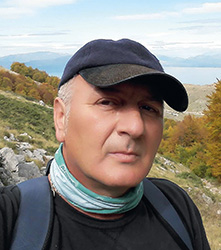 When I first met Mr. Mišo Vujović fifteen years ago and saw samples of National Review ”Serbia”, my first impression was: God had sent me a hardworking and honest man in the development phase of the promotion of Ohrid in Serbia program. Thank you for helping us exceed our determined objectives and finally make a supreme promotion in the most important Serbian media, as well as a promotion at the Fair, which resulted in an enormous increase of the number of Serbian tourists in Ohrid. Congratulations to the team and associates of National Review ”Serbia”, with whom one could talk about anything except quality, since IT IS IMPLIED! I wish you great success and future growth of your Review, which, with its affirming contents, awakes the spirit and initiates respect and brotherly love towards peoples close by faith, customs and culture. When I first met Mr. Mišo Vujović fifteen years ago and saw samples of National Review ”Serbia”, my first impression was: God had sent me a hardworking and honest man in the development phase of the promotion of Ohrid in Serbia program. Thank you for helping us exceed our determined objectives and finally make a supreme promotion in the most important Serbian media, as well as a promotion at the Fair, which resulted in an enormous increase of the number of Serbian tourists in Ohrid. Congratulations to the team and associates of National Review ”Serbia”, with whom one could talk about anything except quality, since IT IS IMPLIED! I wish you great success and future growth of your Review, which, with its affirming contents, awakes the spirit and initiates respect and brotherly love towards peoples close by faith, customs and culture.
Sincerest congratulations!
(*Head of tourism and local economic development of Ohrid, Macedonia)
IVAN MIHAJLOVIĆ, READER FROM KOSOVO AND METOHIJA
Unfortunately, Unrivaled
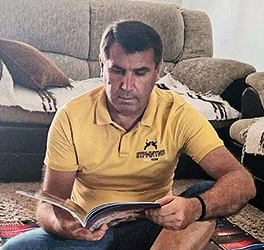 National Review ”Serbia” is a magazine which is, unfortunately, unrivaled in Serbian lands. Unfortunately, because we would be happier if there were more such, or at least similar ones. First, such luxurious and varied magazines printed in Cyrillic alphabet are very rare. Second, because the published texts, sorted and written in a language both an academician and a farmer could adopt, takes off the fog of oblivion from so many great Serbian people. Third, the Review publishes the most wonderful photographs – living pictures of our wonderful Serbia. Fourth, in all that beauty and colorfulness, there was place for the suffering of Serbs throughout former Yugoslavia, especially in our Kosovo and Metohija. If it is true that beauty will save the world, the beauty and truth published in National Revew ”Serbia” will help save our Homeland. National Review ”Serbia” is a magazine which is, unfortunately, unrivaled in Serbian lands. Unfortunately, because we would be happier if there were more such, or at least similar ones. First, such luxurious and varied magazines printed in Cyrillic alphabet are very rare. Second, because the published texts, sorted and written in a language both an academician and a farmer could adopt, takes off the fog of oblivion from so many great Serbian people. Third, the Review publishes the most wonderful photographs – living pictures of our wonderful Serbia. Fourth, in all that beauty and colorfulness, there was place for the suffering of Serbs throughout former Yugoslavia, especially in our Kosovo and Metohija. If it is true that beauty will save the world, the beauty and truth published in National Revew ”Serbia” will help save our Homeland.
(Reader born in Mušutište, Metohija, now living in Barajevo, who keeps all issues of ”National Review”, including special editions)
MILORAD PAVIĆ (1929–2009), WRITER
Diversion
 Of course, I have seen and read the National Review. I couldn’t speak of it any other way. What did I see? They are serious people and because of it, they know how to play. They can admire without being pathetic, engage in difficult matters without being sulky, reject you without hurting you, they have knowledge but do not bore. There is something essentially Slavic and something important Byzantine in them. I’ve known the editor for a long time; we collaborated back in the nineties at SKC (Student’s Cultural Center). When I asked him to explain the essence of his current magazine, he told me two extraordinary things. ”It will be,” he said, ”a highly stylized diversion in colonial culture.” I was surprised. What diversion, with what? I asked. ”Diversion with beauty and self-respect. We will also add humor as needed.” What will you do with humor? ”With humor, we will scatter fools and demons.” Of course, I have seen and read the National Review. I couldn’t speak of it any other way. What did I see? They are serious people and because of it, they know how to play. They can admire without being pathetic, engage in difficult matters without being sulky, reject you without hurting you, they have knowledge but do not bore. There is something essentially Slavic and something important Byzantine in them. I’ve known the editor for a long time; we collaborated back in the nineties at SKC (Student’s Cultural Center). When I asked him to explain the essence of his current magazine, he told me two extraordinary things. ”It will be,” he said, ”a highly stylized diversion in colonial culture.” I was surprised. What diversion, with what? I asked. ”Diversion with beauty and self-respect. We will also add humor as needed.” What will you do with humor? ”With humor, we will scatter fools and demons.”
I answered their questions. I also gave them photos from the family album. I’ll be in the hospital when it comes out (you know, they scheduled surgery for me). And as soon as I recover, I will propose two interesting things to them. I’m sure they’ll accept...”
(From private correspondence, June 2009)
 MOMO KAPOR (1937–2010), PAINTER AND WRITER MOMO KAPOR (1937–2010), PAINTER AND WRITER
Debt
My guys from the National Review were hounding me at the (Belgrade Book) Fair. They wanted me to sign some papers so they could pay me for the texts. ”What money, are you guys sane?” I said. ”You don’t owe me anything. On the contrary, you’re repaying an important part of what is also my debt.”
(October 2008)
MIHAILO MEDENICA, WRITER AND JOURNALIST
From us to us
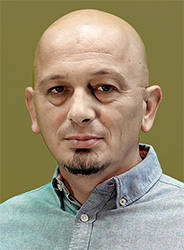 The National Review ”Serbia” – a border and a monument, the cradle and the crucifixion, everything that Serbia is and what is to be written about Serbia with the greatest love! The National Review ”Serbia” – a border and a monument, the cradle and the crucifixion, everything that Serbia is and what is to be written about Serbia with the greatest love!
The National Review is not just a word on paper but a record, a guardian of ourselves for ourselves, and a step towards infinity through which better than us will pass.
Everything we are and everything dearest Serbia is – the National Review carefully, like a prayer book, preserves among its covers woven with letters about the glory and suffering of Serbia and Serbs!
Thank you, Lord, and praise, Lord, these dedicated individuals, dear brothers, and sisters, for the cross they bear in the name of all of us, making a hundred issues like a hundred years of preaching about our Serbia!
May this be just the beginning – may there be many and blessed years ahead!
Thank you to the National Review ”Serbia” for carefully preserving the best of us for us!
|

